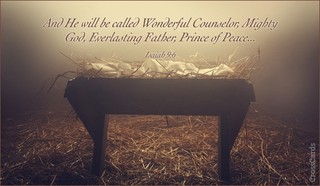- Recent Translations
- All Translations
Isaiah 9:6
Share
Settings
Isaiah 9:6 Meaning and Commentary
For unto us a child is born
This is a reason of all that is said in the context; of the great light that shone upon and was seen by those that sat in darkness, and in the land of the shadow of death; of the great joy among the people; of the breaking off of the yoke, rod, and staff of the oppressor; and of the burning of garments rolled in blood, so putting an end to war, and establishing peace; all which is owing to the child here said to be born, by whom we are to understand the Messiah; as the Targum interprets it; and not Hezekiah, as many of the Jewish writers F14 apply it; who could never be represented as a child just born, when he was, at least, ten or eleven years of age when this prophecy was given out, and twenty nine when Sennacherib came up with his army against him, as Aben Ezra observes; to which time he and others refer the context; nor can any reason be assigned why he should be called a "son", in such a peculiar and unusual manner; nor can it be said of him, that he was the great light which shined upon the inhabitants of Galilee; nor was his birth the occasion of so great joy as the birth of this child is said to be; nor can it, with any justness, be said of him, that of the increase of his government and peace there was no end; seeing his government only extended to the two tribes of Benjamin and Judah, and his reign was but twenty nine years, and for the most part attended with affliction, oppression, and war; besides, the many august titles here used cannot be ascribed unto him, nor to any mere creature whatever F15; but everything agrees with Christ; and to him it is applied, even by some ancient and modern writers among the Jews F16 themselves. This clause respects his humanity, his incarnation and birth, which is spoken of in the present tense, though future, because of the certainty of it; that he should really become man, assume a true body, and a reasonable soul, partake of the same flesh and blood with the children, be made flesh, and dwell among us: and this was to us, (wnl) , "for us": for our good, for our profit and advantage; not for angels, but for men; for the saints under the Old Testament, and under the New; for all his people, his brethren, and children; that they might have a sanctified nature; that law and justice might be satisfied in that nature which had sinned, and Satan be ruined by it, which he himself had ruined; and that Christ might be a fit Mediator and Redeemer of his people, and be capable of executing his several offices to our advantage; his priestly office, by satisfying and interceding for us; his prophetic office, by teaching us; and his kingly office, by ruling over us; and that he might answer the relations he stands in of a father, husband, brother, and friend: unto us a son is given:
even he who is the Son of God, his own Son, his only begotten Son, his beloved Son, the dear Son of his love; all which aggravate his love in the gift of him, to be the covenant and head unto us, to be the Saviour of us, and a sacrifice for us; and in delivering him up into the hands of men, justice, and death; this is a free gift of God's love, a very large and comprehensive one, is unparalleled and unspeakable, unchangeable and irreversible. And the government shall be upon his shoulder:
not only of the world in general, but of the church in particular; this child is born to royal dignity; he is King of saints; his government consists in ruling in the hearts of his people, in enacting laws for them, and causing them to submit unto them, in subduing their enemies, in protecting them, their persons and properties, rights and liberties, and in supplying them with everything necessary; and this government is delegated to him from his Father, is devolved upon him by him, is not of this world, but is spiritual; it is righteously administered, is peaceable, and will continue for ever: and its being said to be "upon his shoulder" is an allusion to magistrates having a key or rod laid on their shoulders, as ensigns of their office, or carried by their officers for them, see ( Isaiah 9:4 ) ( 22:21 ) and it shows that it was laid upon him, or enjoined him by his father, though not against his will; and it denotes a weight of honour and care bore by him, whose shoulders are fit for the same, and equal to it; and that he is the prop and support of his church and people, who are safe under his government and protection: and his name shall be called Wonderful:
not that he should be commonly called among men by this name, nor by any of the following; but that he should appear to be, or to have that in him, or to do what would sufficiently answer to this name, and to the rest: he is wonderful in his person, and in the glory and beauty of it; that he should be God and man in one person, and have two natures, so different from each other, united in him; that he, being truly God, should become man; and that he should be born of a virgin; wonderful in the disposition of his mind, and in the qualities he is possessed of; in his love to his people, and his sympathy with them; in his humility, meekness, and patience; in his wisdom, conduct, courage, and greatness of soul: wonderful in his life; in his private life many wonderful things are recorded of him; as the direction of the wise men to him by a star, and their worshipping of him; the preservation of him from Herod's cruelty; his disputation with the doctors in the temple at twelve years of age; and his living such a mean and obscure life for thirty years together: and his public life was nothing but a continued series of wonders; his baptism in Jordan; his temptations in the wilderness; his doctrines and miracles, and his transfiguration on the mount: wonderful in his death; that he should die at all, who is the Prince of life, the Lord of life and glory; that he should die with his own and his Father's consent, and that for sinners, even the chief of sinners; and by dying procure life for us; abolish death; destroy him that had the power of it, the devil; and obtain eternal salvation and redemption: the circumstances attending his death were marvellous: such as the darkness that was upon the earth; the rending of the vail, and cleaving of the rocks: wonderful in his resurrection from the dead, which was by his own power, before he saw corruption, at the time signified by types and prophecy, and with the same body exceedingly glorious; and which has an influence on our justification, regeneration, and resurrection: wonderful in his ascension to heaven, both in the manner of it, in a cloud, and in the effects of it, receiving gifts for men, and giving them to them; in his entrance into heaven; session at the right hand of God; and intercession for transgressors: wonderful he will be in his second coming to judgment; the signs of it are many and marvellous; the manner of it wonderfully glorious; the different effects of it on men, filling some with joy, and others with terror; and the things that will then be done; as the raising of the dead; placing all nations before him; separating the righteous from the wicked; pronouncing their distinct sentences, and executing them; in a word, Christ is wonderful, in all he is, has, or belong unto him; in his person, offices, and relations; in his people, who are for signs and wonders; in his doctrines and ordinances; and in the manifestations of himself and of his grace to his people, now and hereafter; nay, the word signifies not only "wonderful", but a "miracle" itself, as Christ is in his person F17, see ( Judges 13:17-19 ) : Counsellor;
this some read in conjunction with the former title, thus, "Wonderful Counsellor"; so the Arabic version; and the Septuagint, which calls him, "the Angel of the great council"; and the Targum is,
``who does wonderfully in council;''and which agrees with ( Isaiah 28:29 ) . This title belongs to Christ, as concerned with his Father, and the blessed Spirit, in the works of nature, providence, and grace. God stands in no need of counsel, nor does it properly fall on him, though it is sometimes ascribed to him, speaking after the manner of men. Creatures are not of his council, but Christ is; he was privy to all his thoughts, purposes, and decrees; he was consulted in creation, and in the works of providence, ( Genesis 1:26 ) ( Genesis 11:7 ) and in the great affair of redemption and salvation; the council held concerning that is the great council the Septuagint version here makes mention of; and may be called the council of peace, ( Zechariah 6:13 ) in which the scheme of salvation was fixed; the author of it was found, and pitched upon; the way of it agreed on, to be through the assumption of human nature, and by obedience, sufferings, and death; and the time of Christ's incarnation and death settled, as well as all blessings of grace and glory, for the persons who were to share in this salvation. This title also agrees with Christ in respect to his people, to whom he is council, and for whom he is council; he is council to them; he gives them council; so he did in person, when on earth; he advised sinners to repentance; encouraged souls to believe in him; directed the weary to come to him for rest; the hungry and thirsty for food; such as were healed and pardoned, he counselled them to sin no more; and he advised his followers to do to all men as they would men should do to them; to behave in an humble and modest manner; to bear reproaches and persecutions cheerfully; to love one another; and to pray to his Father, in his name, for all things they wanted: and now he gives his people counsel by the ministry of the word, which is the counsel of God, the produce of his wisdom, a transcript of his eternal council and covenant, a declaration of the will of God, and of Christ; and in which Christ counsels the poor in spirit to come to him for riches, the naked for clothing, the ignorant for spiritual light and knowledge, such as are ready to perish for salvation; and he counsels those that believe to abide in him, and by his truths and ordinances; which counsel is wholesome and suitable, hearty, sincere, and faithful; is wise and prudent, and freely given; and which being taken, infallibly succeeds: he is council for them in heaven; he appears there in the presence of God for them; represents their persons, and presents their petitions; answers to all charges exhibited against them; and, as their advocate, pleads their cause; and calls for blessings agreed to be bestowed upon them, which they want; for all which he is abundantly qualified, being the only wise God, the Ancient of days, the Father of his people; and, as Mediator, the Wisdom of God, in whom all the treasures of wisdom and knowledge are, and on whom the Spirit of wisdom and understanding, and of counsel and might, rests: the mighty God;
or "God the mighty One" F18; as some read the words with a comma; but if read together, the sense is the same; Christ is God, truly and properly so; as appears from his name Jehovah, which is peculiar to the most High; from his nature and perfections, being the same with his Father's: from the works performed by him, as those of creation, providence, miracles, redemption, resurrection from the dead, &c.; and from the worship given him, which only belongs to God; also he is called our God, your God, their God, my God, by which epithets those that are not truly God are never called; he is said to be God manifest in the flesh; God over all, blessed for ever; the great God, the living God, the true God, and eternal life; and he is "the mighty One" as appears by the works he did, previous to his incarnation; as the creation of all things out of nothing; the upholding of all things by the word or his power; the management of all the affairs of providence, there being nothing done but what he was concerned in; as the confusion of languages; the burning of Sodom and Gomorrah; bringing the children of Israel out of Egypt; leading and going before them through the Red Sea and wilderness; and bearing and carrying them all the days of old: and also by the works he did when here on earth; as his miracles, called his mighty works; such as healing all manner of diseases by a word speaking, or by touching the person, or by the person touching him, even his garment, or without seeing the person at all, and always without the use of medicines; dispossessing devils out of the bodies of men; power over the elements, as to change water into wine, rebuke the wind and seas; raising the dead, and even his own body when dead; and, above all, the great work of redemption, by which he appears to be the mighty One indeed; his Father's call of him to it shows it; his undertaking it confirms it; and his actual performance of it puts it out of all doubt; as well as what was then done by him; such as bearing all the sins of his people; engaging with all their enemies; conquering them, and delivering them out of their hands: likewise by what he does now, partly in the conversion of his people; quickening men dead in trespasses and sins; causing dry bones to live; giving spiritual sight to such as were born blind; plucking out of the hands of Satan, and turning from his power to God; which shows him to be stronger than the strong man armed; beginning, carrying on, and finishing the work of faith with power on them; as well as at first making them willing to submit to his righteousness and to be saved by him; and partly in his care of them afterwards; he having the government of them on his shoulders; supplying all their wants; bearing all their burdens; and supporting them under all their afflictions, temptations, and desertions; protecting them from all their enemies; strengthening them to do his will and work; and keeping them from falling totally and finally, and preserving them safe to his everlasting kingdom and glory: moreover, by what he will do hereafter; binding Satan, and confining him for the space of a thousand years; clearing the world of all his and his people's enemies; raising the dead; and judging the world; and destroying wicked men and devils with an everlasting destruction. The everlasting Father;
which does not design any relation of Christ in the Godhead; and there is but one Father in the Godhead, and that is the first Person; indeed Christ and the Father are one, and the Father is in him, and he is in the Father, and he that has seen the one has seen the other, and yet they are distinct, Christ is not the Father; the Son and Spirit may be considered with the first Person as Father, in creation and regeneration, they being jointly concerned therein, but not in the Trinity: it is easy to make it appear Christ is not the Father, but is distinct from him, since he is said to be with the Father from eternity, to be the Son of the Father in truth and love, his own Son, his only begotten and beloved Son; Christ frequently calls the first Person his Father, prayed to him as such, and is our advocate with him, as well as the way unto him; he is said to be sent by the Father, to come from him, and to go to him; and many things are said of Christ that cannot be said of the Father, as his being made flesh, suffering and dying in the room of his people; and the Father is said to do many things unto him, as to anoint him, to seal him, to show him all he did, to commit all judgment to him, and give him to have life in himself as he had: but Christ is a Father with respect to chosen men, who were given him as his children and offspring in covenant; who are adopted into that family that is named of him, and who are regenerated by his Spirit and grace: and to these he is an "everlasting Father"; he was so from everlasting; for regeneration and faith do not make men children, but make them appear to be so; God's elect are children previous to the Spirit's work upon them, and even to the incarnation and death of Christ; adoption is an act of the will of God in covenant from eternity: and Christ is a Father to these unto everlasting; he will never die, and they shall never be left fatherless; he and they will ever continue in this relation; he as such supplies them with everlasting provisions, he clothes them with everlasting raiment, he gives them an everlasting portion, promotes them to everlasting honour, saves them with an everlasting salvation, bearing an everlasting love to them. Some render the words, "the Father of eternity" F19; the author of eternal life, who has procured it for his people, and gives it to them; or to whom eternity belongs, who inhabits it, and is possessed of it, is the everlasting I AM, was before all persons and things, was set up in an office capacity from everlasting, and had a glory with the Father before the world was, in whom eternal election, and with whom the everlasting covenant, were made. The Septuagint version is, "the Father of the world to come" F20; of the Gospel dispensation; so called, ( Hebrews 2:5 ) the legal dispensation, when in being, was the then present world, at the end of which Christ came; this is now at an end, and a new state of things has taken place, which with respect to the Old Testament saints was the world to come, and of this Christ is the Father or author; as the law came by Moses, and he was the father of the legal dispensation, grace and truth are come by Christ, the Father and author of the Gospel dispensation; the doctrines of it are from him, and the ordinances of it by him; and he is the father of that state or world to come after the resurrection, the New Jerusalem church state, and also of the ultimate glory. The Prince of peace;
Christ is a Prince, often so called, ( Ezekiel 34:24 ) ( 37:25 ) ( Daniel 9:25 ) he is so by birth, being the King's Son, the Son of God, and by office, power, and authority; he is so a Prince as that he is a King; he is exalted to be a Prince and a Saviour; and he is a Prince superior to kings, being the Prince of the kings of the earth, ( Acts 5:31 ) ( Revelation 1:5 ) and he is called the "Prince of peace", because he is the author of peace; just as he is said to be the "Prince of life", ( Acts 3:15 ) for the same reason: he is the author of peace between Jew and Gentile, by abrogating the ceremonial law, the enmity between them, and by sending the Gospel to both, and making it the power of God to salvation to some of each of them, and by bringing them into the same Gospel church state, and making them partakers of the same privileges and blessings, internal and external, ( Ephesians 2:14-20 ) and he is the author of peace between God and sinners; he has made it by the blood of the cross, having the chastisement of their peace laid upon him, in consequence of a covenant of peace he made with his Father, who was in him reconciling the world to himself, and he is so called likewise, because he is the giver of peace; of all outward peace and prosperity to his churches, as rest from their enemies, concord among themselves, and additions to them of such as shall be saved; of internal peace through the discoveries of his love, and the application of his righteousness, blood, and sacrifice in a way of believing in him, and in a course of obedience to him; and likewise of eternal peace and rest in the world to come. Moreover, all that concern him as a King or Prince show him to be the Prince of peace: his kingdom lies, among other things, in peace and joy in the Holy Ghost; the sceptre of his kingdom is the golden sceptre of grace and mercy; his royal proclamation is the Gospel of peace; the fruit of his Spirit is peace; and his subjects are peaceable ones, both in church and state. With this compare ( Hebrews 7:2 ) ( 2 Thessalonians 3:16 ) . It is observable that at his birth there was a general peace, not only in the Roman empire, ( Luke 2:1 ) but in all the world; and it is remarkable, that whereas at this time the Chinese empire enjoyed a profound peace, the emperor of it changed his name, and would not be called by his name Ngayus, but Pingus, which signifies "peaceable" F21.
F14 T. Bab. Sanhedrin, fol. 98. 2. & 99. 1. Jarchi, Aben Ezra, Kimchi, & Abarbinel, in loc. Nizzachon Vet. p. 87. R. Isaac. Chizzuk Emuna, par. 1. c. 21. p. 195. Lipman. Carmen. p. 115.
F15 See my book of the Prophecies of the Messiah p. 200, 201.
F16 Debarim Rabba, sect. 1. fol. 234. 4. Perek Shalom, fol. 20. 2. Maimon. apud Maji Synops. Theolog. Jud. p. 121. Vid. Reuchlin de Arte Cabal. p. 745.
F17 (alp) "non admirabilis tantum sed" (kat' exochn) , "miraculum ille est; per se Deus, per unionem hypostaticam", (yeanyrwpov) , Gusset. Ebr. Comment, p. 675.
F18 (rwbg la) "Deus, fortis", V. L. Montanus.
F19 (de yba) "Pater aeternitatis", Montanus, Cocceius
F20 (pathr tou aiwnov mellontov) , so some copies; with which agrees the Vulgate Latin version, "Pater seculi futuri".
F21 Martin, Hist. Sinic. p. 361.
Isaiah 9:6 In-Context
Related Articles
Footnotes 1
- [a] Wonderful; [or] Wise.





